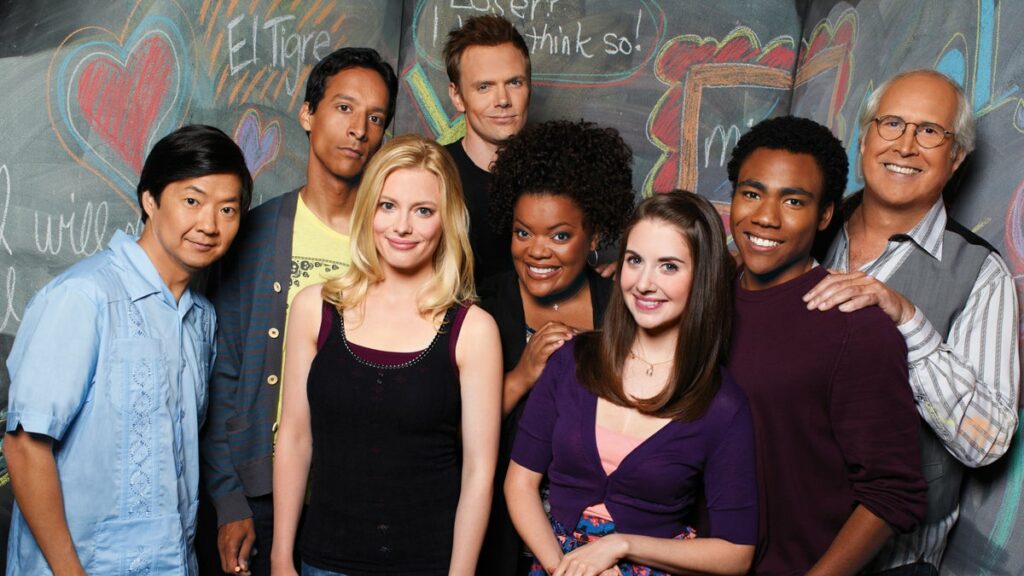
Today, we look at when (or if) you folks believe that Community “jumped the shark.”
This is “Just Can’t Jump It,” a feature where we examine shows that launched in 2006 or later and whether they “jumped the shark.” Jumped the shark means that the show had a specific point in time where, in retrospect, you realize that show was going downhill from there. Not every show DOES jump the shark. Some shows just remain good all the way through. And some shows are terrible all the way through. What we’re looking for are moments where a show that you otherwise enjoyed hit a point where it took a noticeable nose dive after that time and if so, what moment was that?
The great Jon Hein had a website devoted to this topic, but he sold it off in 2006 and after being maintained for a couple of years it was then merged into TV Guide in 2009, so I figured it’d be fun to look at shows that launched after the sale and see what we all think about whether they jumped the shark and, if so, when did it happen? Here is the archive of the show’s we have done far and what the judgments were for those shows.
Today, we look at the charmingly offbeat sitcom, Community, which got to six seasons through hook and crook, and now we’re just waiting for the movie!
So first…DID IT JUMP THE SHARK? Not dramatically so, but yes, I think so.
WHEN DID IT JUMP THE SHARK The show sadly had to deal with too many cast departures. I don’t think it ever quite got over losing Donald Glover’s Troy.
Let me know what you think in the comments or on social media1
Feel free to e-mail me at brian@popculturereferences.com for suggestions for shows for us to do in future installments!










100% agreed
Would argue it didn’t jump the shark. It got weaker once Chase and Glover left the series and “the Greendale Seven” were no more, but I still think the series managed to stay high quality and enjoyable. And being weird and over the top is part of the premise of that series and what made it work.
I’d argue it jumped the shark when Dan Harmon was fired after season 3. Season 4 was obviously “off” in many ways, and Harmon’s return in S5 didn’t quite right the ship. By then the cast departures had started, so the obstacles kept piling up. It was still a good show and occasionally even a great show, but it was never quite the same show it was in those first three years.
Six Seasons and a Movie
From paintball wars to alternate timelines, Community breaks the mold of traditional sitcoms, inviting viewers to rethink the concept of comedic brilliance. Dan Harmon, the producer and creator of Community, is well known for his work on other cinematic masterpieces such as the Avengers movies and television show Rick and Morty. Once again, he did not disappoint to compose a brilliant and exciting source of entertainment. This television show aired for six seasons with several bumps in the road. One such bump happened in between seasons four and five. Many avid fans of the sitcom felt that this transition was a “jump the shark” moment. Jump the shark is a common slang term that is used in cinema to represent a moment when the show or movie begins to decrease in quality. Community is about a group of college rejects at a community college. These rejects come together in a study group and become a tight-knit family. Each member of this metaphorical family has a specific role in the show and upholds individually unique archetypes. These characters are interdependent upon one another to form a cohesive cast and plot. Inbetween the production of seasons four and five, a personal argument happens between Chevy Chase, one of the actors, and the main director of the series, leading to Chevy Chase not being recast in season five. This change was the start of the off balancing of Community. Later in season five, another actor, Donald Glover, leaves the cast to pursue a career in rap music. The loss of Donald Glover and Chevy Chase was the jump the shark moment in the community franchise. With the loss of these two characters in season five, the series would never be the same.
Community begins by pulling the viewer into the world of Greendale Community College. It quickly becomes apparent that this college is not a standard college, but a hub for people who are not accepted by the world; built to help them feel a sense of belonging. Dan Harmon excels in making the viewer feel accepted as a member of this fictional collage. The main characters, often referred to as the study group, each have unique relationships with each other that are vital to the storyline. The self-proclaimed leader and main protagonist of this study group is Jeff Winger played by Joel McHale. Jeff led this band of misfits through a series of exciting journies and adventures as they tried to find an easy way to graduate from college. These adventures were full of meta-humor, pop culture references, and innovative storytelling techniques. Episodes frequently parody different cinematic genres; from action to horror, Community showcased a television show’s ability to be creative and unique. Additionally, the series hit on themes of friendship, identity, and the importance of community, resonating with audiences through its heartfelt moments and relatable experiences.
The relationship between Chevy Chase portraying Pierce Hawthorn, and Jeff Winger was a critical relationship that influenced the plot of the series. Pierce Haawthorn was a rich, elderly, and often abrasive man whose presence added a unique juxtaposition to the group dynamics within the show. Pierce served as a catalyst for conflict, humor, and occasional moments of surprising vulnerability. Despite his flaws, Pierce had an undeniable charisma and provided a distinct comedic flavor that contributed significantly to the show’s early success. One of Pierce’s key functions was as a foil to the rest of the study group, particularly to Jeff. Pierce embodied a contrasting set of values and attitudes, consistently challenging Jeff’s leadership and the group’s unity. Pierce’s outlandish behavior and politically incorrect remarks often led to tension within the group, serving as a source of both amusement and discomfort for viewers. Furthermore, Pierce’s departure from the show had a profound negative impact on its dynamic and narrative direction. With his absence, Community lost an essential element of its original cast, disrupting the delicate balance of personalities that had been established over the preceding seasons. The absence of Pierce deprived the show of his unique brand of humor and the potential for conflict that he brought to the table. Additionally, his departure left a void in the group dynamics, altering the interpersonal relationships and character interactions that had been central to the show’s appeal.
A fan favorite of relationships among the study group is that of Troy Barnes and Abed Nadir, portrayed by Donald Glover and Dani Pudi respectively. Troy and Abed’s relationship was at the heart of many memorable and beloved storylines. The dynamic between Troy and Abed, often described as one of the show’s highlights, brought a unique blend of humor, heart, and even surrealism to Community. Their friendship transcended mere sitcom conventions, evolving into a symbol of pure childhood friendship. All who watch the friendship between Troy and Abed can not help but become personally invested in it. This relationship begins to feel so real and tangible it transcends the realm of television. Truly the relationship Troy and Abed form is one of the most important aspects of the show’s success and enjoyment. Every fan knew that the disruption of their friendship would have negative consequences for the show.
Ultimately, Troy did leave the show and the consequences were seen. Actor Donald Glover had been developing his career as a singer and ultimately he had great success. His career as the “Childish Gambino” took off leaving no room for his humble role as Troy in the sitcom. Troy’s departure left a noticeable void within the group dynamic, one that the show struggled to fill adequately. Community had always been an ensemble cast, each character contributing their quirks and eccentric mannerisms, Troy’s absence left a palpable gap in the narrative. Attempts to compensate for his departure, such as introducing new characters or redistributing storylines, often felt forced or contrived. The loss of Troy not only affected the show’s comedic timing but also its emotional resonance, as his departure disrupted the delicate balance of relationships that had been carefully cultivated over previous seasons. Donald Glover’s departure not only marked the exit of a crucial cast member, but also represented a shift in the show’s creative direction. His multifaceted talent played a significant role both on and off-screen as he assisted in the writing of scenes. This disruption clearly penetrated the narrative of the show leaving viewers wanting more.
Even with the absence of two of the original cast members, the show continued on. Many debates ensued on the possibility of the planned sixth and final season. In the second season, episode 21, a mantra was born into the hearts of devoted fans. Six seasons and a movie became the chant of the fans as the series progressed. This stemmed from Abed breaking the fourth wall and predicting the series will continue for six seasons and a movie. Fans adopted this and wanted to fulfill that prophecy, even with the loss of cast members. The writers of the show did their best to recreate nostalgic memories from earlier seasons and provide what the audience wanted. With the introduction of new actors to fill in the apparent voids in the study group, the show pressed onward. In the second half of season five and the entirety of season six, many beautiful episodes were created. Even with the creation of some great episodes, the atmosphere and emotions portrayed were still lacking. For followers of the series, the new strangers to the community family did not do a sufficient job filling in the void left by Troy and Pierce.
With all its ups and downs, Community still stands as a testimony to the originality and creativeness of its creators. Dan Harmon and his team were able to craft a sitcom that defied all previously held notions of what entertainment could be and entertained audiences for six seasons. Despite the challenges that faced them with cast departures, the show remained a beacon of innovative storytelling and heartfelt comedy to all who watched. The departure of key characters such as Pierce Hawthorn and Troy Barnes undoubtedly left a void in the production of the show, as well as in the hearts of viewers. The disruption of their disappearance was noticed in the relationships and dynamics that had been meticulously crafted throughout the series among the other cast members as well. The unique blend of humor and abrasiveness created by Pierce Hawthorn was crucial in the development of the characters around him. His departure was a loss to the show, but his aid in the development of other characters stood strong. Similarly, the departure of Troy Barnes left an irreplaceable change in the group dynamic. This change was felt in the audience as well because his friendship with Abed Nadir had become a cornerstone of the enjoyment. Despite these challenges, Community persisted in being lifted up by its dedicated fanbase and the enduring spirit of its remaining characters. While the show may have experienced a decline in its later seasons, its legacy as a groundbreaking and beloved sitcom remains deeply rooted in the hearts of its followers. As fans continue to chant “six seasons and a movie,” the spirit of “Community” lives on, a testament to the enduring power of friendship, community, and laughter.